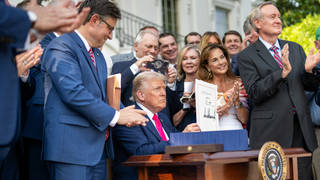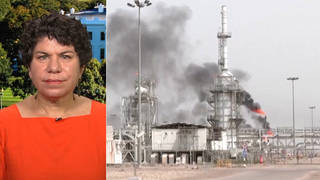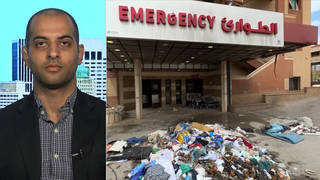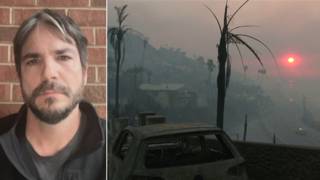
Guests
- Bob Graywildland fire ecologist with decades of experience in Canada, the United States and overseas.
In Canada, the province of British Columbia has declared a state of emergency where entire towns have been burned to the ground in the country’s worst wildfire season ever. Evacuation orders are in place for more than 35,000 people, and 30,000 more have been told to be prepared to evacuate. Nearly all 20,000 residents have already left the city of Yellowknife, the capital of Canada’s Northwest Territories. Scientists say climate change is increasing the risk of wildfires because they are fueled by the increasingly hot and dry weather. “There’s a symbiosis here between how the climate is changing relative to the length of a potential fire season and the fuels that provide energy to fires,” says Bob Gray, a wildland fire ecologist, speaking to us from Chilliwack, British Columbia. Gray warns that Canada’s firefighting workforce is stretched thin, relying on a network of provincial firefighters, contractors and international firefighters.
Transcript
AMY GOODMAN: This is Democracy Now!, democracynow.org, The War and Peace Report. I’m Amy Goodman.
We end today’s show in Canada, where troops are now being mobilized to fight huge wildfires across Canada as it faces its worst wildfire season on record. British Columbia has declared a provincial state of emergency. Evacuation orders are in place for more than 35,000 people.
For more, we go to Chilliwack, British Columbia, for an update. We’re joined by Bob Gray, wildland fire ecologist, 45-year veteran of fire suppression, prescribed burning and research management in Canada, the U.S. and overseas.
Welcome to Democracy Now!, Bob Gray. It’s great to have you with us, but under very bad circumstances. Can you explain what’s happening right now in British Columbia and then the Northwest Territories and across Canada?
BOB GRAY: Sure. Good morning, Amy.
I’ll start here with British Columbia. We’re in the midst of a record fire season as far as area burned. It’s also been a very catastrophic fire season across Canada. We’ve had five firefighters who have been killed. Now we’re at about 1.7 million hectares burned. That’s 4.2 million acres. Last record we had was only five years ago, and that was 1.3 million hectares. So we’re on a bit of an upward trajectory as far as burned area.
Leading up to this, we had a drought last summer, which extended well into the fall and winter, below-normal snowpack in some places, normal in others, but it came off very quickly. And the fires started in June and have just not abated. We’re looking at a little bit of a change in weather today, but winds are coming in once again, a chance of some precip at the tail end of Hurricane Hilary extending this far north. And then we’re back into hot dry again, which will be preceded by winds once again.
So it’s challenging firefighters. We don’t have a large firefighting workforce across Canada. We rely on provincial and territorial firefighters and contractors. This year, luckily, we’ve been able to pull in resources from the U.S. and overseas. The U.S. firefighters are especially very helpful because they’ve worked in these ecosystems before.
But just it’s a long, drawn-out battle, and it’s not over. We have another probably two months of fire season to go. And a lot of folks are on evacuation, about 150,000 across Canada. We’ve got probably 30,000, 40,000 here in BC and another 30,000 or 40,000 on evacuation alert. And these winds coming up today and tomorrow will test that once again.
AMY GOODMAN: Bob Gray, if you can talk about the links between this record-breaking rage of wildfires, if you will, and its connection to climate change, to the increasingly hot and dry weather that’s being experienced? I mean, I think the missing element — certainly, the media in the United States, the corporate media, does cover weather extensively, now about 24/7, but it’s those two words, “climate change,” that you’re less likely to hear.
BOB GRAY: Yeah, there’s really — there’s a symbiosis here between how the climate is changing relative to the length of a potential fire season and the fuels that provide energy to fires. So, we are seeing longer fire seasons — they start earlier, and they go later; hotter, drier conditions; significantly higher vapor-pressure deficit, which draws moisture out of fuels; higher daytime temperatures, lower daytime humidities. And overnight, we’re not seeing the recovery that we used to. So, burning conditions kind of in the past would kind of, sort of slow down and stop in the mid-evening and overnight because of high humidity. Well, now it’s extending right through the night and into the morning, so in some places we’re seeing 24-hour burning going on. So, longer, hotter, drier conditions, that just dries out the fuel, the more fuel that’s available for longer. It’s just a matter of probabilities if we get an ignition. And then, once things are going, it’s awfully hard to put them out. So, it’s a combination of two.
Climate change is also leading to soil moisture deficit, so that’s drought. We have a landscape that is carrying far too much density in the way of forests than it did historically. So, more trees are stressed. The more we stress trees, the more we cause insects disease, actual, basically, drought-caused death. More trees die, more fuel. So, it’s a coupling of things. It’s not just climate change. If we didn’t have the fuel, we can have hot, dry conditions and not have fires. So, they really are a combined problem that we’re facing.
AMY GOODMAN: So, you have nearly all the 20,000 residents who have left the city of Yellowknife, the capital of Canada’s Northwest Territories, not to mention what’s happening in British Columbia. You have long pushed for more prescribed burns to reduce the chance of these massive fires. Has that been put into effect? We just have a minute for your final response.
BOB GRAY: No, it hasn’t. Here in BC, they used to burn about 100,000 hectares a year, up until the early '90s, but lots of escapes and smoke. And they never really developed social license to do it. Right now in BC, we're burning less than 10,000 hectares a year, and we should be burning a couple hundred thousand. So, we have to build capacity, knowledge, experience. We have to reduce barriers to do it. And it is effective. It’s highly effective. And cultural fire, too, carried out by Indigenous people. That’s what these landscapes were stewarded through. It was food security through burning. So, we do have to get back to those practices, and they do work.
AMY GOODMAN: Well, we want to thank you very much for being with us. Of course, we’ll continue to cover this. Bob Gray, wildland fire ecologist, fire suppression expert, currently speaking to us from Chilliwack, British Columbia.
That does it for our show. Democracy Now! is produced with Renée Feltz, Mike Burke, Deena Guzder, Messiah Rhodes, Nermeen Shaikh, María Taracena, Tami Woronoff, Charina Nadura, Sam Alcoff, Tey-Marie Astudillo, John Hamilton, Robby Karran, Hany Massoud and Sonyi Lopez. Our executive director is Julie Crosby. Special thanks to Becca Staley, Jon Randolph, Paul Powell, Mike Di Filippo, Miguel Nogueira, Hugh Gran, Denis Moynihan, David Prude and Dennis McCormick.
If you’d like to sign up for our daily digest, emailed directly to you, go to democracynow.org. I’m Amy Goodman. Thanks so much for joining us.













Media Options